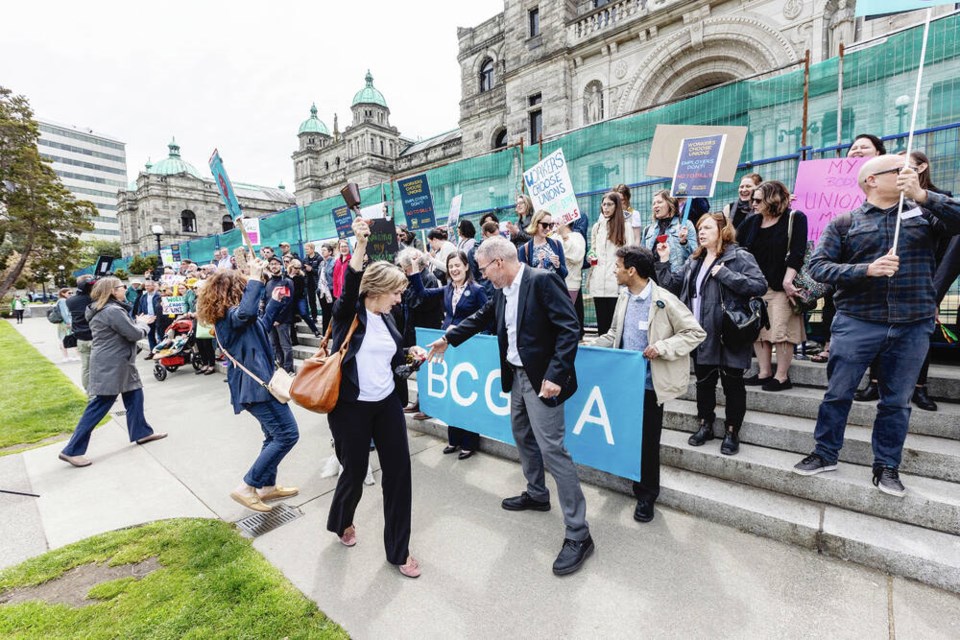You know when the kids are making a racket in another room and you get used to an ambient level of screams and thumps and then suddenly it goes quiet and you know right away something is wrong?
Watching the NDP government is just like that. Caucus members will yammer on for hours about anything and everything. But when they suddenly shut up at the same time, you know there’s trouble.
It happened this week again. (Pro tip for legislature watchers: The less the NDP has to say about a bill, the more suspicious you should be.)
They gave up defending the bill that bars more than 300 government lawyers from forming their own union. Finance Minister Katrine Conroy introduced it — just because somebody had to say something about it. One other NDP member — Environment Minister George Heyman — tried to back her up.
Then the NDP side hunkered down together like penguins in a blizzard and let the opposition critics wear themselves out. The government even extended the time allotted.
“Knock yourselves out,” was the message. “Literally.”
Sixteen BC United and Green MLAs attacked the premises behind the bill from all angles, but not a single NDP MLA tried to counter.
“This is like playing ping pong with yourself,” BC United MLA Mike de Jong said.
The same thing happened when objectionable changes to the freedom of information law got too controversial in 2021. They went mute for two days and ignored opposition arguments. It was extraordinary then. Now it looks like part of the NDP playbook.
There is quite a contrast between this week’s still-life tableau on the government benches and the scene last year on a related matter.
When the government changed the certification process to make joining a union easier, debate on the general principles behind the change went on for days. At least six New Democrats spoke at great length about how important it was.
They were “incredibly honoured to take part in the debate.” The air was full of NDP talk about “freedom of association” and “no barriers to unionization.”
There was a dire warning: “If we look at the process by which people actually join a union, you really see the opportunities for employers to frustrate that right.
“We believe employers must maintain a circumspect position during an organizing campaign, to ensure that employees are able to freely choose whether or not they wish to belong to a trade union.”
Then the government lawyers tried to actually use that new process. They collected signatures from the majority of its members indicating they wanted to unionize.
Goodbye to the idea of the employer staying out of it. A one-page bill was introduced right in the middle of the group’s application to the Labour Relations Board that quashes the attempt. It says the lawyers will be finally free to unionize, but only on the government’s terms.
That effectively means joining the Professional Employees Association rather than forming their own. It’s out of convenience, to keep government unions from proliferating.
All that stuff about freedom of association last year? Now it is considered “a threat to the stability” of public-sector labour relations.
“You can’t just open the door to one employee group and expect that you will be able to close it back again,” Conroy explained to the house.
So scarcely a year after extended-play odes to the sanctity of free association, New Democrats have clammed up while the government forces its hand. Maybe they were embarrassed because about 30 government lawyers were in the gallery watching part of the play.
The lawyers protesting outside made more noise than the NDP MLAs did inside.
The Canadian Bar Association is “deeply disappointed” with this move, saying “we remain very concerned about government actions that force any employee group to be part of a union not of their choosing.”
When Heyman volunteered to defend the bill, he indignantly rejected the idea it has anything to do with curbing free association.
It just gives the lawyers collective bargaining rights, he said.
“That is what the bill does. That is what words say. That is what the words mean.”
But the crashing silence from his colleagues says a lot more.
>>> To comment on this article, write a letter to the editor: [email protected]



